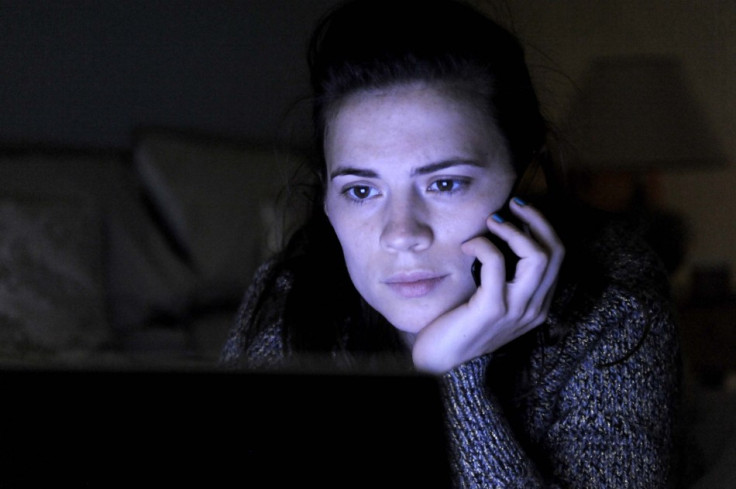Black Mirror Season 2 Episode 1 Review - Be Right Back

2012 had a lot of things going for it. The Queen's Diamond Jubilee, the Olympics and the Paralympics; but what it didn't have was Black Mirror. 14 months on from the first series of the sci-fi satire, and writer Charlie Brooker is continuing to confirm that he is just as adept writing for television as critiquing it. The three new standalone stories feature as before different characters, different settings and different tones, but they all carry the same portentous message of how technological advancement is not necessarily for the better.
Whilst technology is the focus of Black Mirror, the stories always revolve around how they are used to serve, and disrupt, our most primal emotions. In the first episode, Be Right Back, it is grief. Martha (Hayley Atwell) moves with her partner Ash (Domhnall Gleeson) into his old family cottage, about to start a happy family life together. But all that is shattered when Ash is killed in a car accident, leaving a distraught Martha struggling to cope with the loss of her beloved.
Return from the grave
The sci-fi concept introduced here is that in this future, when someone dies through collecting all of their correspondence (emails, photos, social media), they can be 'resurrected'. First, as Ash on the phone talking to Martha, and later on, scarily imprinted onto a synthetic body that looks identical to the original.
It's a great examination of how much of ourselves we put into our technological creations and online profiles. Social media titans such as Facebook, YouTube and Twitter are all fully supported through the individual contributions of millions of people, as we share are personal details, photos and videos of ourselves willingly for others to see. In the 21<sup>st century we all hold dual lives, with the web another world full of our individual footprints.
Love will tear us apart again
Be Right Back is similar in style to the final episode of season one, The Entire History of You, a quiet and intimate portrait of how technology in the future could affect our relationship with one another. But this time, rather than breaking down a couple's relationship, here it is artificially kept going in a future world where even our memories of the dead can be brought back to life.
The crucial question is whether if such technology existed, would it be a good thing? Martha's colleague certainly thinks so, signing her up for the technology as she says, "It will help to cope". Initially we see Martha's smile return, as she appears to linger in the happy moments from their past for hours on end whilst she talks to the resurrected Ash. But in the lonely cottage she ignores visits from her sister and seemingly shuts out the world to lead a solitary life. It is only after she gets the full upgrade, and Ash's details are transferred into an android, that she realises that this miraculous technology will never be able to rekindle true human emotions.
Refreshing female lead
After the first three Black Mirror stories all had men as their leads, it's a refreshing change that here the focus in on a lead female character. Hayley Atwell, who you'll recognise as the poorly written love interest in Captain America, carries the weight of an hour long drama on her shoulders with aplomb; going from bereaved to enamoured to detached in the space of 60 minutes.
Unfortunately as Ash is killed off so soon into the episode, his return does not carry the same emotional power for the audience as it does for Martha. But perhaps this is the point. As the exchange over Ash's secret fondness for The Bee Gees at the episode's beginning testifies, maybe Martha never really knew Ash before either.
Happy together
The ending highlights the problems of Martha's emotional ties to Ash as she stops his replicant from killing himself. Her daughter grows up, and the two appear to have gone through a pseudo-divorce, though in a twisted touch this fake Ash must never be more than 50 metres from the point he was activated. Thus, in choosing to bring Ash back to help cope with her grief, the two are effectively trapped together in the isolated cottage for the rest of their days.
It's a bittersweet notion, but an ending nowhere near as bleak as previous instalments. Whilst a thoroughly engrossing hour of television, the lack of interaction for most of the episode (Martha spends at least half of it on the phone), might leave some underwhelmed. Brooker shows impressive restraint to stop the script veering into melodrama, and his subtle storytelling keeps the fantastic elements of the plot grounded, but at the same time the episode never quite manages to hit another gear.
But when it comes to mature drama that ties cerebral concerns for our future lives with an emotional story of engaging characters, the first episode of Black Mirror succeeds on both levels. Next week's episode, The White Bear, set during a zombie-like apocalypse whereby half the population have turned into brainless voyeurs, promises a great deal more wallop, terror and action.
Related Articles
Black Mirror: Charlie Brooker's Grim Sci-Fi Satire Portrays Fearful Future
© Copyright IBTimes 2025. All rights reserved.






















